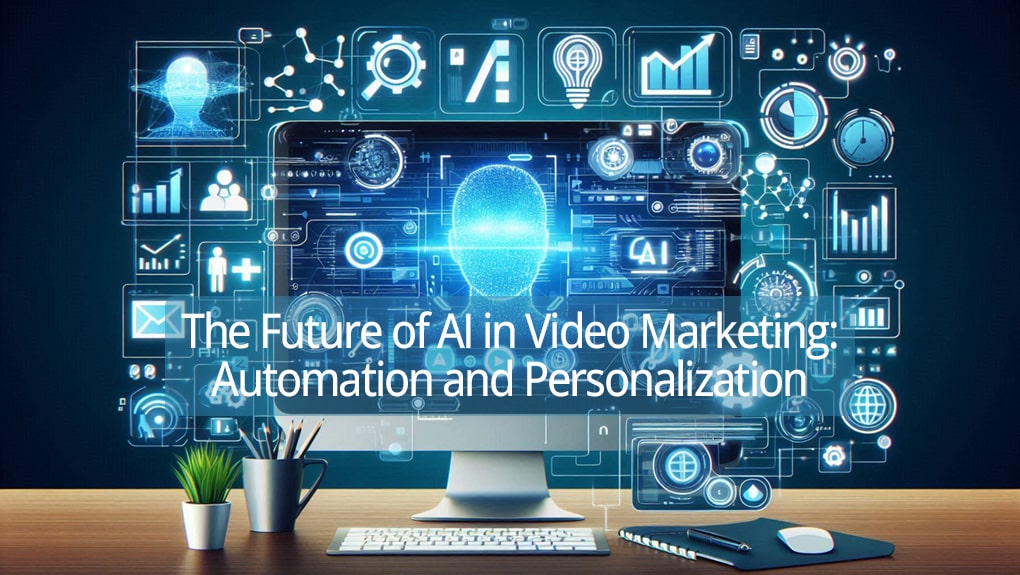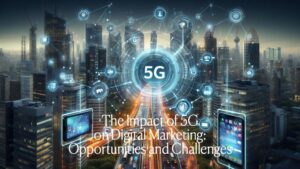|
Getting your Trinity Audio player ready...
|

Video marketing has been a cornerstone of digital marketing strategies for several years. Its effectiveness in capturing attention and conveying messages has made it indispensable for brands worldwide. However, with the advent of Artificial Intelligence (AI), the landscape of video marketing is undergoing a transformation that promises to elevate its impact to unprecedented heights. AI’s capabilities in automation and personalization are driving this change, offering marketers new ways to engage audiences and achieve their goals more efficiently. This article delves into how AI is revolutionizing video marketing, exploring the realms of automation and personalized video content.
The Rise of AI in Video Marketing
AI has steadily infiltrated various aspects of digital marketing, and video marketing is no exception. The integration of AI into video marketing brings several benefits:
- Efficiency: AI-powered tools can automate time-consuming tasks, allowing marketers to focus on strategy and creativity.
- Personalization: AI can analyze vast amounts of data to deliver highly personalized content, enhancing viewer engagement and satisfaction.
- Scalability: AI enables the creation and management of large volumes of video content, making it easier to scale marketing efforts.
Automation in Video Marketing
Video Creation
One of the most significant advantages of AI in video marketing is its ability to automate the video creation process. Traditional video production can be resource-intensive, requiring significant time, effort, and expertise. AI tools are now available to streamline this process.
Scriptwriting: AI-powered tools like ChatGPT can generate scripts based on specific keywords, themes, or audience preferences. These tools can analyze successful video scripts and create new ones that are likely to resonate with the target audience.
Editing: Video editing can be automated with AI tools that identify the best clips, trim unnecessary parts, and even add transitions and effects. Platforms like Magisto and Adobe Premiere Pro utilize AI to enhance the editing process, making it faster and more efficient.
Voiceovers and Subtitles: AI can generate realistic voiceovers and accurate subtitles, ensuring that videos are accessible and engaging. Text-to-speech technology has advanced significantly, providing natural-sounding voiceovers that enhance the viewing experience.
Video Distribution
AI also plays a crucial role in the distribution of video content. By analyzing audience behavior and preferences, AI can determine the best times to publish videos, the most effective platforms for distribution, and the optimal formats for different audiences.
Content Scheduling: AI tools can automate the scheduling of video posts across multiple platforms, ensuring that content is published at times when it is most likely to reach and engage the target audience.
Platform Optimization: Different platforms have varying requirements and audience behaviors. AI can tailor video content to suit each platform, optimizing formats, lengths, and presentation styles to maximize engagement.
Performance Analysis: AI can monitor the performance of video content in real-time, providing insights into viewer engagement, watch times, and conversion rates. This data allows marketers to adjust their strategies and improve future video campaigns.
Personalization in Video Marketing
Data-Driven Insights
Personalization in video marketing relies heavily on data. AI excels at analyzing vast amounts of data to extract valuable insights about audience preferences, behaviors, and demographics. This information is crucial for creating personalized video content that resonates with viewers on a deeper level.
Audience Segmentation: AI can segment audiences based on various criteria, such as demographics, interests, and past interactions. This segmentation allows marketers to create targeted video content that addresses the specific needs and preferences of each audience segment.
Behavioral Analysis: By tracking viewer behavior, such as watch times, likes, shares, and comments, AI can identify patterns and trends. This analysis helps marketers understand what types of content are most engaging and tailor their videos accordingly.
Personalized Video Content
AI enables the creation of highly personalized video content that speaks directly to individual viewers. This level of personalization enhances viewer engagement and fosters a deeper connection between the brand and its audience.
Dynamic Content: AI can create dynamic video content that changes based on the viewer’s preferences and behaviors. For example, an AI-powered video ad might showcase different products or messages depending on the viewer’s past interactions with the brand.
Interactive Videos: Interactive videos allow viewers to engage with the content in real-time, making choices that influence the video’s outcome. AI can tailor these interactions to each viewer, creating a unique and personalized experience.
Recommendation Engines: Similar to how Netflix and YouTube recommend videos based on viewing history, AI-powered recommendation engines can suggest personalized video content to viewers. This keeps audiences engaged and encourages them to consume more content.
Case Studies and Examples
Netflix
Netflix is a prime example of how AI-driven personalization can revolutionize video content delivery. The platform uses AI to analyze viewer data and recommend shows and movies that align with individual preferences. This personalized approach has been instrumental in retaining subscribers and increasing viewer satisfaction.
Amazon Prime Video
Amazon Prime Video employs AI to enhance its recommendation engine, providing users with personalized content suggestions based on their viewing habits. Additionally, AI-driven insights help Amazon optimize its original content production, ensuring that new releases resonate with their audience.
Coca-Cola
Coca-Cola has leveraged AI to create personalized video ads. In one campaign, the company used AI to generate thousands of unique video ads tailored to individual viewers’ preferences, such as their favorite music genres and sports teams. This level of personalization resulted in higher engagement and improved ad performance.
The Future of AI in Video Marketing
The future of AI in video marketing is promising, with several emerging trends set to shape the industry:
Advanced Analytics
AI’s ability to analyze data will continue to improve, providing marketers with even deeper insights into audience behavior and preferences. This will enable more precise targeting and personalization, resulting in highly effective video marketing campaigns.
Enhanced Creativity
AI tools will become more sophisticated, assisting marketers in generating creative ideas and concepts for video content. This collaboration between AI and human creativity will lead to innovative and engaging video marketing strategies.
Real-Time Personalization
As AI technology advances, real-time personalization will become more prevalent. Marketers will be able to adjust video content dynamically based on real-time data, ensuring that viewers receive the most relevant and engaging experiences.
Ethical Considerations
With the increasing use of AI in video marketing, ethical considerations will become more important. Marketers will need to ensure that AI-driven personalization respects user privacy and data security. Transparency and ethical AI practices will be crucial for maintaining consumer trust.
As a Result
AI is revolutionizing video marketing by introducing automation and personalization at unprecedented levels. The ability to automate video creation, distribution, and performance analysis streamlines marketing efforts, allowing marketers to focus on strategy and creativity. Simultaneously, AI-driven personalization enhances viewer engagement and satisfaction by delivering tailored content that resonates with individual preferences.
As AI technology continues to evolve, its impact on video marketing will only grow stronger. Marketers who embrace AI’s potential and leverage its capabilities will be well-positioned to lead in the dynamic and competitive landscape of digital marketing. The future of AI in video marketing promises a new era of efficiency, creativity, and personalized experiences that will redefine how brands connect with their audiences.
P.S. If you’re looking to elevate your digital presence and navigate your own journey to success, reach out to Cosmos Revisits for tailored marketing strategies that can help you achieve your goals.




